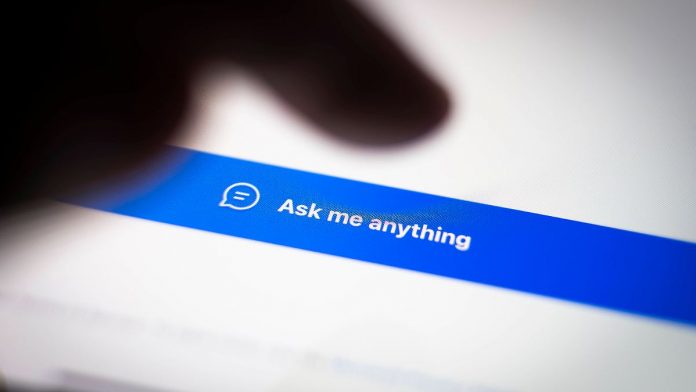But no search engine
ChatGPT now recognizes emotions – and can sing
This audio version was artificially generated. More info | Send feedback
ChatGPT developer OpenAI announces a new version of its AI model, but speculation about its own search engine is not confirmed. Instead, the AI can now have Hollywood-style conversations.
The popular chatbot ChatGPT can now have a conversation with people and recognize their emotions. With its natural voice and short reaction time, the new AI model GPT-4o is reminiscent of voice assistants from Hollywood films. The developer company OpenAI will also make it available to free users. However, it remained unclear after the presentation how well the software can speak German.
ChatGPT was already able to talk to users in principle – but with breaks to process the data. Now OpenAI has shown how the software can vary the tone of voice from excited to compassionate – and also translates fluently between English and Italian. ChatGPT is thus becoming a powerful competitor to the voice assistants of tech heavyweights such as Amazon's Alexa and Apple's Siri, which seem very simple in comparison. Recently there were media reports that Apple was negotiating with OpenAI about integrating the company's technology into its software.
Another innovation: At the same time as spoken commands, ChatGPT can also process information from a smartphone camera. In a livestream, OpenAI demonstrated, among other things, how the new model can help solve a math equation. ChatGPT gave advice on the calculation method by voice without revealing the result. An OpenAI employee wrote the equation on a piece of paper and pointed the smartphone camera at it. He asked ChatGPT questions verbally – and the software followed his progress via camera. The only mistake: the chatbot first claimed that it saw the task before it even wrote down the equation. “Oops, I was too excited,” ChatGPT apologized.
AI bedtime stories
An OpenAI employee also asked the chatbot to recognize its mood from its facial expression. However, it didn't make it difficult for ChatGPT with a broad grin. This also applies to other live demonstrations on Monday: They worked largely smoothly, but it is not known how well the software works under real everyday circumstances. All interactions were initiated with the wake-up phrase “Hey, ChatGPT” – similar to what we know from today's voice assistants.
In another demo, ChatGPT invented a bedtime story and read it out loud. You could interrupt the software and ask it to add drama to your voice or speak like a robot. ChatGPT even sang the last sentence if you wanted.
OpenAI boss Sam Altman wrote after the presentation that it was the best way to use a computer he had ever experienced. “It feels like the AI from movies. And I'm still a little surprised that it's real.” Altman and other OpenAI users had previously referred to the decade-old film “Her,” in which the protagonist played by Joaquin Phoenix falls in love with an AI assistant software. The female voice of ChatGPT in the presentation was indeed reminiscent of the film.
ChatGPT has around 100 million users
At the same time warned IT security expert Rachel Tobac immediately that, for example, functions such as automatic translation can be used for scam calls that previously failed due to language barriers.
OpenAI subscription customers will get more performance in the model. At the same time, OpenAI made interactions cheaper for commercial users. Altman wrote that there will be plenty of things that you can charge money for. And that will help OpenAI to hopefully serve billions of people for free. According to current information, ChatGPT has around 100 million users. It will probably take a few weeks until the new model is widely available. A few hours after the presentation, OpenAI reported a glitch in the model, but this was quickly resolved.
The timing of the presentation is interesting: This Tuesday, Google is holding its annual developer conference, where announcements about new features using artificial intelligence are expected. Google already showed a few months ago how its AI software Gemini can process spoken and visual information.
OpenAI rival presents Claude
Shortly before the Google I/O conference, OpenAI rival Anthropic also announced the European launch of its AI assistant Claude. Tests have shown that Claude works very well in German, French and Italian, among other languages, said Anthropic co-founder Jack Clark. Similar to ChatGPT, Claude can use artificial intelligence to formulate sentences at a human level and summarize the content of texts. The web version, the iPhone app and a variant for companies will be available in Europe.
Anthropic released the current generation, Claude 3, in March, which outperformed the GPT-4 model from ChatGPT developer OpenAI in some technical tests. Anthropic points out that Claude can also summarize long texts and answer questions about them. This makes the software particularly useful for legal experts, as well as in the medical and financial sectors, stressed co-founder Jared Kaplan. The company does not currently plan to store data in Europe, but is open to it if customers want it. At the same time, customer data is always encrypted and therefore only accessible to them.
Anthropic has also been successful in reducing so-called “hallucinations,” in which the software gives false information, said Kaplan. The “hallucinations” are a fundamental problem of AI programs that are related to the way they work. The software is trained with huge amounts of information. When formulating texts, it decides word by word how a sentence is likely to continue. This can result in completely incorrect information, even if the AI models have only been fed correct information. Anthropic tries to minimize such errors in Claude by comparing them with facts. In a similar way, the formulated sentences are also compared with basic rules to prevent insults or discrimination.


